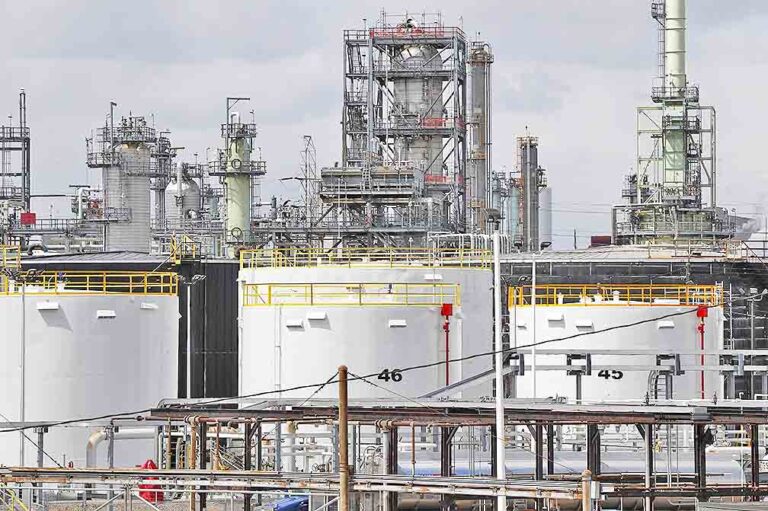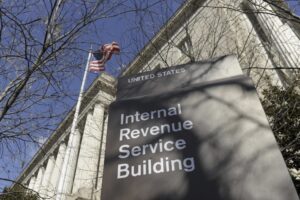WASHINGTON — President Joe Biden on Tuesday ordered 50 million barrels of oil released from America’s strategic reserve to help bring down energy costs, in coordination with other major energy consuming nations, including China, India and the United Kingdom.
The move is aimed at global energy markets, but also at U.S. voters who are coping with higher inflation and rising prices ahead of Thanksgiving and winter holiday travel. Gasoline prices are at about $3.40 a gallon, more than 50% higher than a year ago, according to the American Automobile Association.
The government will begin to move barrels into the market in mid to late December.
But the action is unlikely to immediately bring down gas prices significantly as families begin traveling for the holidays. Gasoline usually responds at a lag to changes in oil prices, and administration officials suggested this is one of several steps toward ultimately bringing down costs.
There was no major impact on the price for a benchmark barrel of U.S. crude right after the announcement. Prices have been up and down all month, and were up less than 1% so far in this holiday shortened week.
The actions by the U.S. and others also risk counter moves by Gulf nations, especially Saudi Arabia, and by Russia. Saudi Arabia and other Gulf countries have made clear they intend to control supply to keep prices high for the time being.
As word spread in recent days of a coming joint release from U.S. and other countries’ reserves, there were warnings from OPEC interests that those countries may respond in turn, reneging on promises to increase supplies in coming months.
Biden has scrambled to reshape much of his economic agenda around the issue of inflation, saying that his recently passed $1 trillion infrastructure package will reduce price pressures by making it more efficient and cheaper to transport goods.
Republican lawmakers have hammered the administration for inflation hitting a 31-year high in October. The consumer price index soared 6.2% from a year ago — the biggest 12-month jump since 1990.
Senate Republican Leader Mitch McConnell tore into the White House in a floor speech last week, saying the victims of higher prices were middle class Americans.
“The three biggest drivers of the staggering 6.2% inflation rate we logged last month were housing, transportation, and food,” the Kentucky senator said. “Those aren’t luxuries, they’re essentials, and they take up a much bigger share of families’ budgets from the middle class on down.”
The Strategic Petroleum Reserve is an emergency stockpile to preserve access to oil in case of natural disasters, national security issues and other events. Maintained by the Energy Department, the reserves are stored in caverns created in salt domes along the Texas and Louisiana Gulf Coasts. There are roughly 605 million barrels of sweet and sour petroleum in the reserve.
“As we come out of an unprecedented global economic shutdown, oil supply has not kept up with demand, forcing working families and businesses to pay the price,” Energy Secretary Jennifer Granholm said in a statement. “This action underscores the president’s commitment to using the tools available to bring down costs for working families and to continue our economic recovery.”
The Biden administration has argued that the reserve is the right tool to help ease the supply problem. Americans used an average of 20.7 million barrels a day during September, according to the Energy Information Administration. That means that the release nearly equals about two-and-a-half days of additional supply.
The pandemic made energy markets — like everything else — haywire on multiple fronts. As the closures began in April, 2020, demand collapsed and oil futures prices turned negative. Energy traders did not want to get stuck with crude that they could not store. But as the economy recovered, prices jumped to a seven-year high in October.
U.S. production has not recovered. Energy Information Administration figures indicate that domestic production is averaging roughly 11 million barrels daily, down from 12.8 million before the pandemic started.
Republicans have also seized on Biden’s efforts to minimize drilling and support renewable energy as a reason for the decreased production, though there are multiple market dynamics at play as fossil fuel prices are higher around the world.
Meanwhile, Biden and administration officials insist that tapping more oil from the reserve is not a contradiction with the president’s long-term climate goals, because this is a short-term fix to meet a specific problem, while climate policies are a long-term answer over decades.
They argue that because they are pushing to boost renewable energy, there will eventually be less dependence in the U.S. on fossil fuels. But that’s a politically convenient argument – in simple terms, higher prices reduce usage, and significantly higher gasoline prices could force Americans into less reliance on fossil fuels.
The White House decision comes after weeks of diplomatic negotiations. Biden and China President Xi Jinping talked over steps to counter tight petroleum supplies in their virtual meeting earlier this month, when the two “discussed the importance of taking measures to address global energy supplies,” according to the White House account of the conversation.
Japan and South Korea are also participating. Administration officials say it’s the biggest coordinated release from global strategic reserves.
The U.S. Department of Energy will make the oil available from the Strategic Petroleum Reserve in two ways; 32 million barrels will be released in the next few months and will return to the reserve in the years ahead, the White House said. Another 18 million barrels will be part of a sale of oil that Congress had previously authorized.
White House Press Secretary Jen Psaki said Monday evening that the White House would also keep tabs on the oil companies.
“We will continue to press oil companies who have made record profits and are overseeing what we consider to be price gouging out there when there’s a supply of oil or the price of oil is coming down and the price of gas is not coming down,” Psaki said. “It does not take an economic expert to know that’s a problem.”
The Associated Press is an independent global news organization dedicated to factual reporting. Founded in 1846, AP today remains the most trusted source of fast, accurate, unbiased news in all formats and the essential provider of the technology and services vital to the news business. The Trucker Media Group is subscriber of The Associated Press has been granted the license to use this content on TheTrucker.com and The Trucker newspaper in accordance with its Content License Agreement with The Associated Press.








